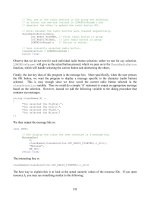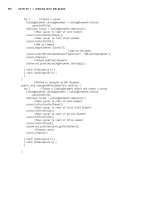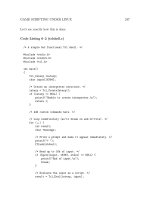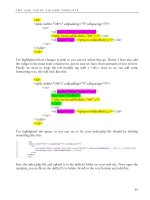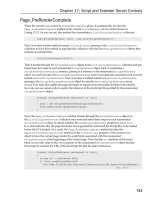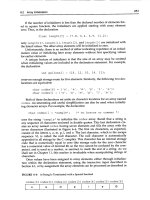Object-Oriented Programming with PHP 5 phần 7 pps
Bạn đang xem bản rút gọn của tài liệu. Xem và tải ngay bản đầy đủ của tài liệu tại đây (347.65 KB, 26 trang )
Standard PHP Library
[ 144 ]
In the interesting example shown below, we are extending ArrayObject and
creating a more exible ExtendedArrayObject for prototype like functionality. The
extended array provides easier traversing through the collection. Let's have a look:
<?
class ExtendedArrayObject extends ArrayObject {
private $_array;
public function __construct()
{
if (is_array(func_get_arg(0)))
$this->_array = func_get_arg(0);
else
$this->_array = func_get_args();
parent::__construct($this->_array);
}
public function each($callback)
{
$iterator = $this->getIterator();
while($iterator->valid())
{
$callback($iterator->current());
$iterator->next();
}
}
public function without()
{
$args = func_get_args();
return array_values(array_diff($this->_array,$args));
}
public function first()
{
return $this->_array[0];
}
public function indexOf($value)
{
return array_search($value,$this->_array);
}
public function inspect()
{
echo "<pre>".print_r($this->_array, true)."</pre>";
}
public function last()
{
Chapter 6
[ 145 ]
return $this->_array[count($this->_array)-1];
}
public function reverse($applyToSelf=false)
{
if (!$applyToSelf)
return array_reverse($this->_array);
else
{
$_array = array_reverse($this->_array);
$this->_array = $_array;
parent::__construct($this->_array);
return $this->_array;
}
}
public function shift()
{
$_element = array_shift($this->_array);
parent::__construct($this->_array);
return $_element;
}
public function pop()
{
$_element = array_pop($this->_array);
parent::__construct($this->_array);
return $_element;
}
}
?>
If you want to see how to use it, here it goes:
<?
include_once("ExtendedArrayObject.class.php");
function speak($value)
{
echo $value;
}
$newArray = new ExtendedArrayObject(array(1,2,3,4,5,6));
/* or you can use this */
$newArray = new ExtendedArrayObject(1,2,3,4,5,6);
$newArray->each(speak); //pass callback for loop
print_r($newArray->without(2,3,4)); //subtract
$newArray->inspect(); //display the array in a nice manner
Standard PHP Library
[ 146 ]
echo $newArray->indexOf(5); //position by value
print_r($newArray->reverse()); //reverse the array
print_r($newArray->reverse(true)); /*for changing array itself*/
echo $newArray->shift();//shifts the first value of the array
//and returns it
echo $newArray->pop();// pops out the last value of array
echo $newArray->last();
echo $newArray->first(); //the first element
?>
The result looks like this:
123456
Array
(
[0] => 1
[1] => 5
[2] => 6
)
Array
(
[0] => 1
[1] => 2
[2] => 3
[3] => 4
[4] => 5
[5] => 6
)
4
Array
(
[0] => 6
[1] => 5
[2] => 4
[3] => 3
[4] => 2
[5] => 1
)
Array
(
[0] => 6
[1] => 5
[2] => 4
[3] => 3
[4] => 2
[5] => 1
)
6125
Chapter 6
[ 147 ]
ArrayIterator
ArrayIterator is used to iterate over the elements of an array. In SPL, ArrayObject
has a built-in Iterator, which you can access using getIterator function. You can
use this object to iterate over any collection. Let's take a look at the example here:
<?php
$fruits = array(
"apple" => "yummy",
"orange" => "ah ya, nice",
"grape" => "wow, I love it!",
"plum" => "nah, not me"
);
$obj = new ArrayObject( $fruits );
$it = $obj->getIterator();
// How many items are we iterating over?
echo "Iterating over: " . $obj->count() . " values\n";
// Iterate over the values in the ArrayObject:
while( $it->valid() )
{
echo $it->key() . "=" . $it->current() . "\n";
$it->next();
}
?>
This will output the following:
Iterating over: 4 values
apple=yummy
orange=ah ya, nice
grape=wow, I love it!
plum=nah, not me
However, an Iterator also implements the IteratorAggregator interface so you can
even use them in the foreach() loop.loop.
<?php
$fruits = array(
"apple" => "yummy",
"orange" => "ah ya, nice",
"grape" => "wow, I love it!",
"plum" => "nah, not me"
);
$obj = new ArrayObject( $fruits );
Standard PHP Library
[ 148 ]
$it = $obj->getIterator();
// How many items are we iterating over?
echo "Iterating over: " . $obj->count() . " values\n";
// Iterate over the values in the ArrayObject:
foreach ($it as $key=>$val)
echo $key.":".$val."\n";
?>
You will get the same output as the previous one.
If you want to implement Iterator to your own collection, collection, I
recommend you take a look at Chapter 3. If you want to know how to implement
IteratorAggregator, here is an example for you:
<?php
class MyArray implements IteratorAggregate
{
private $arr;
public function __construct()
{
$this->arr = array();
}
public function add( $key, $value )
{
if( $this->check( $key, $value ) )
{
$this->arr[$key] = $value;
}
}
private function check( $key, $value )
{
if( $key == $value )
{
return false;
}
return true;
}
public function getIterator()
{
return new ArrayIterator( $this->arr );
}
}
?>
Chapter 6
[ 149 ]
Please note that if key and value are the same, it will not return that value while
iterating. You can use it like this:
<?php
$obj = new MyArray();
$obj->add( "redhat","www.redhat.com" );
$obj->add( "php", "php" );
$it = $obj->getIterator();
while( $it->valid() )
{
echo $it->key() . "=" . $it->current() . "\n";
$it->next();
}
?>
The output is:
redhat=www.redhat.com
DirectoryIterator
Another very interesting class introduced in PHP5 is DirectoryIterator. This
object can iterate through the items present in a directory (well, those nothing but
les) and you can retrieve different attributes of that le using this object.
In the PHP Manual this object is not well documented. So if you want to know
the structure of this object and supported methods and properties, you can use
ReflectionClass for that. Remember the ReflectionClass we used in the
previous chapter? Let's take a look at the following example:
<?php
ReflectionClass::export(DirectoryIterator);
?>
The result is:
Class [ <internal:SPL> <iterateable> class DirectoryIterator
implements Iterator, Traversable ]
{
- Constants [0] { }
- Static properties [0] { }
- Static methods [0] { }
- Properties [0] { }
- Methods [27]
{
Method [ <internal> <ctor> public method __construct ]
{
- Parameters [1]
{
Standard PHP Library
[ 150 ]
Parameter #0 [ <required> $path ]
}
}
Method [ <internal> public method rewind ] { }
Method [ <internal> public method valid ] { }
Method [ <internal> public method key ] { }
Method [ <internal> public method current ] { }
Method [ <internal> public method next ] { }
Method [ <internal> public method getPath ] { }
Method [ <internal> public method getFilename ] { }
Method [ <internal> public method getPathname ] { }
Method [ <internal> public method getPerms ] { }
Method [ <internal> public method getInode ] { }
Method [ <internal> public method getSize ] { }
Method [ <internal> public method getOwner ] { }
Method [ <internal> public method getGroup ] { }
Method [ <internal> public method getATime ] { }
Method [ <internal> public method getMTime ] { }
Method [ <internal> public method getCTime ] { }
Method [ <internal> public method getType ] { }
Method [ <internal> public method isWritable ] { }
Method [ <internal> public method isReadable ] { }
Method [ <internal> public method isExecutable ] { }
Method [ <internal> public method isFile ] { }
Method [ <internal> public method isDir ] { }
Method [ <internal> public method isLink ] { }
Method [ <internal> public method isDot ] { }
Method [ <internal> public method openFile ]
{
- Parameters [3] {
Parameter #0 [ <optional> $open_mode ]
Parameter #1 [ <optional> $use_include_path ]
Parameter #2 [ <optional> $context ]
}
}
Method [ <internal> public method __toString ] { }
}
}
We have a handful of useful methods here. Let's make use of them. In the following
example we will just create a directory crawler, which will display all les and
directories in a specic drive. Take a look at one of my directories on the C drive
called spket:
Chapter 6
[ 151 ]
Now, if you run the following code, you will get the list of les and directories
inside it:
<?
$DI = new DirectoryIterator("c:/spket");
foreach ($DI as $file) {
echo $file."\n";
}
?>
The output is:
.
plugins
features
readme
.eclipseproduct
epl-v10.html
notice.html
startup.jar
configuration
spket.exe
spket.ini
Standard PHP Library
[ 152 ]
But the output doesn't make any sense. Can you detect which are the directories and
which are the les? It's very difcult, so let's make the result useful for us.
<?
$DI = new DirectoryIterator("c:/spket");
$directories = array();
$files = array();
foreach ($DI as $file) {
$filename = $file->getFilename();
if ($file->isDir()){
if(strpos($filename,".")===false)
$directories[] = $filename;
}
else
$files[] = $filename;
}
echo "Directories\n";
print_r($directories);
echo "\nFiles\n";
print_r($files);
?>
The output is:
Directories
Array
(
[1] => plugins
[2] => features
[3] => readme
[4] => configuration
)
Files
Array
(
[0] => .eclipseproduct
[1] => epl-v10.html
[2] => notice.html
[3] => startup.jar
[4] => spket.exe
[5] => spket.ini
)
Chapter 6
[ 153 ]
You may ask at this point, if there is a shortcut link, how you can detect it. Simple,
just use the $file->isLink() function to detect if that le is a shortcut.
Let's take a look at other useful methods of the DirectoryIterator object:object:
Methods Feature
getPathname()
Returns the absolute path name (with le name) of this le.
getSize()
Returns size of le in number of bytes.
getOwner()
Returns the owner ID.
getATime()
Returns the last access time in timestamp.
getMTime()
Returns the modication time in timestamp.
getCTime()
Returns the creation time in timestamp.
getType()
Returns either "le", "dir", or "link".
Other methods are quite self explanatory, so we are not covering them here. One
more thing to remember however, is getInode(), getOwner(), and getGroup() will
return 0 in win32 machines.
RecursiveDirectoryIterator
So what is this object? Remember our previous example? We got a list of directories
and les only. However, what if we want to get a list of all directories inside that
directory without implementing the recursion? Then RecursiveDirectoryIterator
is here to save your life.
The recursive directory Iterator can be used to great effect with
RecursiveIeratorIterator to implement the recursion. Let's take a look at the
following example, it traverses through all the directories under a directory (no
matter how nested it is):
<?php
// Create the new iterator:
$it = new RecursiveIteratorIterator(new RecursiveDirectoryIterator(
'c:/spket' ));
foreach( $it as $key=>$file )
{
echo $key."=>".$file."\n";
}
?>
Standard PHP Library
[ 154 ]
The output is like this one:
c:/spket/epl-v10.html=>epl-v10.html
c:/spket/notice.html=>notice.html
c:/spket/startup.jar=>startup.jar
c:/spket/configuration/config.ini=>config.ini
c:/spket/configuration/org.eclipse.osgi/.manager/
.fileTableLock=>.fileTableLock
c:/spket/configuration/org.eclipse.osgi/.manager/
.fileTable.4=>.fileTable.4
c:/spket/configuration/org.eclipse.osgi/.manager/
.fileTable.5=>.fileTable.5
c:/spket/configuration/org.eclipse.osgi/bundles/4/1/.cp/
swt-win32-3236.dll=>swt-win32-3236.dll
c:/spket/configuration/org.eclipse.osgi/bundles/4/1/.cp/
swt-gdip-win32-3236.dll=>swt-gdip-win32-3236.dll
c:/spket/configuration/org.eclipse.osgi/bundles/48/1/.cp/os/win32/
x86/localfile_1_0_0.dll=>localfile_1_0_0.dll
c:/spket/configuration/org.eclipse.osgi/bundles/69/1/.cp/os/win32/
x86/monitor.dll=>monitor.dll
c:/spket/spket.exe=>spket.exe
c:/spket/spket.ini=>spket.ini
………
I can hear you asking yourself: 'why are these useless les printed here?' Just take a
look at directory structure and see how it retrieves the entire le name with their
path as key.
RecursiveIteratorIterator
To recursively iterate over a collection, you can make take advantage of
this object introduced in SPL. Let's take a look at the following example to
understand how effectively it can be used in your everyday programming. In the
previous sections and also in the coming sections we see many examples using
RecursiveIteratorIterator; so we are not giving any more examples in
this section.
AppendIterator
If you want to use a collection of Iterators to iterate through, then this could be your
life saver. This object saves all the Iterators in a collection and iterates through all of
them at once.
Chapter 6
[ 155 ]
Let's take a look at the following example of append Iterator, where we traverse
through a collection of Iterators and then minimize the code:
<?
class Post
{
public $id;
public $title;
function __construct($title, $id)
{
$this->title = $title;
$this->id = $id;
}
}
class Comment{
public $content;
public $post_id;
function __construct($content, $post_id)
{
$this->content = $content;
$this->post_id = $post_id;
}
}
$posts = new ArrayObject();
$comments = new ArrayObject();
$posts->append(new post("Post 1",1));
$posts->append(new post("Post 2",2));
$comments->append(new Comment("comment 1",1));
$comments->append(new Comment("comment 2",1));
$comments->append(new Comment("comment 3",2));
$comments->append(new Comment("comment 4",2));
$a = new AppendIterator();
$a->append($posts->getIterator());
$a->append($comments->getIterator());
//print_r($a->getInnerIterator());
foreach ($a as $key=>$val)
{
if ($val instanceof post)
echo "title = {$val->title}\n";
else if ($val instanceof Comment )
echo "content = {$val->content}\n";
}
?>
Standard PHP Library
[ 156 ]
And here comes the output:
title = Post 1
title = Post 2
content = comment 1
content = comment 2
content = comment 3
content = comment 4
FilterIterator
As its name suggests, this Iterator helps you to lter out the result through iteration
so that you get only the results you require. This Iterator is very useful for iteration
with ltering,
FilterIterator exposes two extra methods over a regular Iterator. One is accept()
which is called every time in internal iteration and is your key point to perform the
lter. The second one is getInnerIterator(), which returns the current Iterator
inside this FilterIterator.
In this example we use FilterIterator to lter out data while traversing through
a collection.
<?php
class GenderFilter extends FilterIterator
{
private $GenderFilter;
public function __construct( Iterator $it, $gender="F" )
{
parent::__construct( $it );
$this->GenderFilter = $gender;
}
//your key point to implement filter
public function accept()
{
$person = $this->getInnerIterator()->current();
if( $person['sex'] == $this->GenderFilter )
{
return TRUE;
}
return FALSE;
}
}
$arr = array(
Chapter 6
[ 157 ]
array("name"=>"John Abraham", "sex"=>"M", "age"=>27),
array("name"=>"Lily Bernard", "sex"=>"F", "age"=>37),
array("name"=>"Ayesha Siddika", "sex"=>"F", "age"=>26),
array("name"=>"Afif", "sex"=>"M", "age"=>2)
);
$persons = new ArrayObject( $arr );
$iterator = new GenderFilter( $persons->getIterator() );
foreach( $iterator as $person )
{
echo $person['name'] . "\n";
}
echo str_repeat("-",30)."\n";
$persons = new ArrayObject( $arr );
$iterator = new GenderFilter( $persons->getIterator() ,"M");
foreach( $iterator as $person )
{
echo $person['name'] . "\n";
}
?>
If you run the code, you will get the following result:
Lily Bernard
Ayesha Siddika
John Abraham
Afif
I'm sure you will agree that this is quite interesting, however did you get the catch?
This is ltered by the following entry point:
public function accept()
{
$person = $this->getInnerIterator()->current();
if( $person['sex'] == $this->GenderFilter )
{
return TRUE;
}
return FALSE;
}
}
Standard PHP Library
[ 158 ]
LimitIterator
What if you want to dene the start point from where your iteration will start
and also dene the times you want to iterate? This is made possible using
LimitIterator.
LimitIterator takes three parameters while constructing. The rst one is a regular
Iterator, the second one is the starting offset, and the third one is the number of times
that it will iterate. Take a look at the following example:
<?
$arr = array(
array("name"=>"John Abraham", "sex"=>"M", "age"=>27),
array("name"=>"Lily Bernard", "sex"=>"F", "age"=>37),
array("name"=>"Ayesha Siddika", "sex"=>"F", "age"=>26),
array("name"=>"Afif", "sex"=>"M", "age"=>2)
);
$persons = new ArrayObject($arr);
$LI = new LimitIterator($persons->getIterator(),1,2);
foreach ($LI as $person) {
echo $person['name']."\n";
}
?>
And the output is:
Lily Bernard
Ayesha Siddika
NoRewindIterator
This is another Iterator in which you can't invoke the rewind method. That means it
is a forward-only Iterator, which can read a collection only once. Take a look at the
structure; if you execute the following code you will get the methods supported by
this Iterator:
<?
print_r(get_class_methods(NoRewindIterator));
//you can also use refelection API as before to see the methods.//you can also use refelection API as before to see the methods.
?>
Chapter 6
[ 159 ]
The output would be the methods, as seen below:
Array
(
[0] => __construct
[1] => rewind
[2] => valid
[3] => key
[4] => current
[5] => next
[6] => getInnerIterator
)
Surprisingly, it has no rewind method, but you can see it, can't you? Well, that
method has no implementation, it is empty. It is there as it implements the Iterator
interface, but there is no implementation of that function, so you can't rewind.
<?
$arr = array(
array("name"=>"John Abraham", "sex"=>"M", "age"=>27),
array("name"=>"Lily Bernard", "sex"=>"F", "age"=>37),
array("name"=>"Ayesha Siddika", "sex"=>"F", "age"=>26),
array("name"=>"Afif", "sex"=>"M", "age"=>2)
);
$persons = new ArrayObject($arr);
$LI = new NoRewindIterator($persons->getIterator());
foreach ($LI as $person) {
echo $person['name']."\n";
$LI->rewind();
}
?>
If the rewind() method works, this code will be an endless loop. But in practical, it
displays the output as shown below:
John Abraham
Lily Bernard
Ayesha Siddika
Afif
SeekableIterator
This is an interface introduced in SPL, which many Iterator classes actually
implement internally. If this interface is implemented, you can perform seek()
operation inside this array.
Standard PHP Library
[ 160 ]
Let's take a look at the following example where we implement SeekableIterator
to provide a searching facility over a collection:
<?
$arr = array(
array("name"=>"John Abraham", "sex"=>"M", "age"=>27),
array("name"=>"Lily Bernard", "sex"=>"F", "age"=>37),
array("name"=>"Ayesha Siddika", "sex"=>"F", "age"=>26),
array("name"=>"Afif", "sex"=>"M", "age"=>2)
);
$persons = new ArrayObject($arr);
$it = $persons->getIterator();
$it->seek(2);
while ($it->valid())
{
print_r($it->current());
$it->next();
}
?>
The output is:
Array
(
[name] => Ayesha Siddika
[sex] => F
[age] => 26
)
Array
(
[name] => Afif
[sex] => M
[age] => 2
)
RecursiveIterator
This is another interface introduced by SPL for easy recursion over nested collections.
By implementing this interface and using it with RecursiveIteratorIterator, you you
can easily traverse through nested collections.
Chapter 6
[ 161 ]
If you implement RecursiveIterator, you have to apply two methods, one is
hasChildren(), which must determine whether the current object is an array orwhich must determine whether the current object is an array or
not (and that means if it has children or not) and the second one is getChildren(),
which must return an instance of the same class over the collection. That's it. To
understand the bigger picture, take a look at the following example:
<?
$arr = array(
"john"=>array("name"=>"John Abraham", "sex"=>"M", "age"=>27),
"lily"=>array("name"=>"Lily Bernard", "sex"=>"F", "age"=>37),
"ayesha"=>array("name"=>"Ayesha Siddika", "sex"=>"F", "age"=>26),
"afif"=>array("name"=>"Afif", "sex"=>"M", "age"=>2)
);
class MyRecursiveIterator extends ArrayIterator implements
RecursiveIterator
{
public function hasChildren()
{
return is_array($this->current());
}
public function getChildren()
{
return new MyRecursiveIterator($this->current());
}
}
$persons = new ArrayObject($arr);
$MRI = new RecursiveIteratorIterator(new MyRecursiveIterator($persons
));
foreach ($MRI as $key=>$person)
echo $key." : ".$person."\n";
?>
The output is:
name : John Abraham
sex : M
age : 27
name : Lily Bernard
sex : F
age : 37
name : Ayesha Siddika
sex : F
age : 26
name : Afif
sex : M
age : 2
Standard PHP Library
[ 162 ]
SPLFileObject
This is another fantastic object introduced in SPL for basic le operations. You can
iterate through the content of the le in a more elegant way using this object. In
SPLFileObject, the following methods are supported: the following methods are supported:
Array
(
[0] => __construct
[1] => getFilename
[2] => rewind
[3] => eof
[4] => valid
[5] => fgets
[6] => fgetcsv
[7] => flock
[8] => fflush
[9] => ftell
[10] => fseek
[11] => fgetc
[12] => fpassthru
[13] => fgetss
[14] => fscanf
[15] => fwrite
[16] => fstat
[17] => ftruncate
[18] => current
[19] => key
[20] => next
[21] => setFlags
[22] => getFlags
[23] => setMaxLineLen
[24] => getMaxLineLen
[25] => hasChildren
[26] => getChildren
[27] => seek
[28] => getCurrentLine
[29] => __toString
)
If you carefully look into it, you will nd that general le functions in PHP are
implemented in this object, which gives you more exibility to work with.
Chapter 6
[ 163 ]
In the following example we will discuss how to use SPLFileObject:
<?
$file = new SplFileObject("c:\\lines.txt");
foreach( $file as $line ) {
echo $line;
}
?>
Therefore, it works in the same was as an Iterator, you can rewind, seek, and perform
other general tasks. There are also some interesting functions like getMaxLineLen,
fstat, hasChildren, getChildren etc.
Using SPLFileObject you can retrieve remote les too.
SPLFileInfo
This is another object introduced by SPL, which helps you to retrieve le information
of any specic le. Let's have a look at the structure rst:
Array
(
[0] => __construct
[1] => getPath
[2] => getFilename
[3] => getPathname
[4] => getPerms
[5] => getInode
[6] => getSize
[7] => getOwner
[8] => getGroup
[9] => getATime
[10] => getMTime
[11] => getCTime
[12] => getType
[13] => isWritable
[14] => isReadable
[15] => isExecutable
[16] => isFile
[17] => isDir
[18] => isLink
[19] => getFileInfo
[20] => getPathInfo
[21] => openFile
Standard PHP Library
[ 164 ]
[22] => setFileClass
[23] => setInfoClass
[24] => __toString
)
You can use SPLFileInfo to open any le. However, what is more interesting is that
it supports overloading the opening of a le. You can supply your open le manager
class to it and it will be invoked while opening a le.
Let's take a look at the following example.
<?php
class CustomFO extends SplFileObject
{
private $i=1;
public function current()
{
return $this->i++ . ": " .
htmlspecialchars($this->getCurrentLine())."";
}
}
$SFI= new SplFileInfo( "splfileinfo2.php" );
$SFI->setFileClass( "CustomFO" );
$file = $SFI->openFile( );
echo "<pre>";
foreach( $file as $line )
{
echo $line;
}
?>
This example will output the following:
1:
2: <?php
3:
4: class CustomFO extends SplFileObject
{
5: private $i=1;
6: public function current()
{
7:
8: return $this->i++ . ": " .
htmlspecialchars($this->getCurrentLine())."";
9: }
Chapter 6
[ 165 ]
10: }
11: $SFI= new SplFileInfo( "splfileinfo2.php" );
12:
13: $SFI->setFileClass( "CustomFO" );
14: $file = $SFI->openFile( );
15: echo "<pre>";
16: foreach( $file as $line )
{
17: echo $line;
18: }
19:
20: ?>
21:
22:
SPLObjectStorage
Beside Directory, File Objects and Iterators, SPL also introduced another cool
object which can store any object inside it with special facilities. This object is called
SPLObjectStorage. We will understand this using the example later on in this chapter.
SPLObjectStorage can store any object in it. When you change the main object, the
object that is stored inside the SPLObjectStorage will also be changed. If you try to
add a specic object more than once, it won't add actually. You can also delete the
object from the storage any time.
Besides this, SPLObjectStorage provides the facility to iterate through a collection
of stored objects. Let's take a look at the following example, which demonstrates the
use of SPLObjectStorage:
<?
$os = new SplObjectStorage();
$person = new stdClass();// a standard object
$person->name = "Its not a name";
$person->age = "100";
$os->attach($person); //attached in the storage
foreach ($os as $object)
{
print_r($object);
echo "\n";
}
$person->name = "New Name"; //change the name
echo str_repeat("-",30)."\n"; //just a format code
Standard PHP Library
[ 166 ]
foreach ($os as $object)
{
print_r($object); //you see that it changes the original object
echo "\n";
}
$person2 = new stdClass();
$person2->name = "Another Person";
$person2->age = "80";
$os->attach($person2);
echo str_repeat("-",30)."\n";
foreach ($os as $object)
{
print_r($object);
echo "\n";
}
echo "\n".$os->contains($person);//seek
$os->rewind();
echo "\n".$os->current()->name;
$os->detach($person); //remove the object from collection
echo "\n".str_repeat("-",30)."\n";
foreach ($os as $object)
{
print_r($object);
echo "\n";
}
?>
The output is as follows:
stdClass Object
(
[name] => It's not a name
[age] => 100
)
stdClass Object
(
[name] => New Name
[age] => 100
)
stdClass Object
Chapter 6
[ 167 ]
(
[name] => New Name
[age] => 100
)
stdClass Object
(
[name] => Another Person
[age] => 80
)
1
New Name
stdClass Object
(
[name] => Another Person
[age] => 80
)
Summary
After introducing PHP5 to the world, the PHP team introduced the strong object
oriented programming in PHP to PHP developers. PHP5 comes with a lot of handy
built-in objects amongst which SPL is a fantastic one. It eases programming for many
tasks, which were once quite tough. So SPL introduced many objects that we have
just discussed and learned how to use. As the PHP manual doesn't have updated
and detailed information on all of these classes, you can count this chapter as a good
reference for programming with SPL objects.
